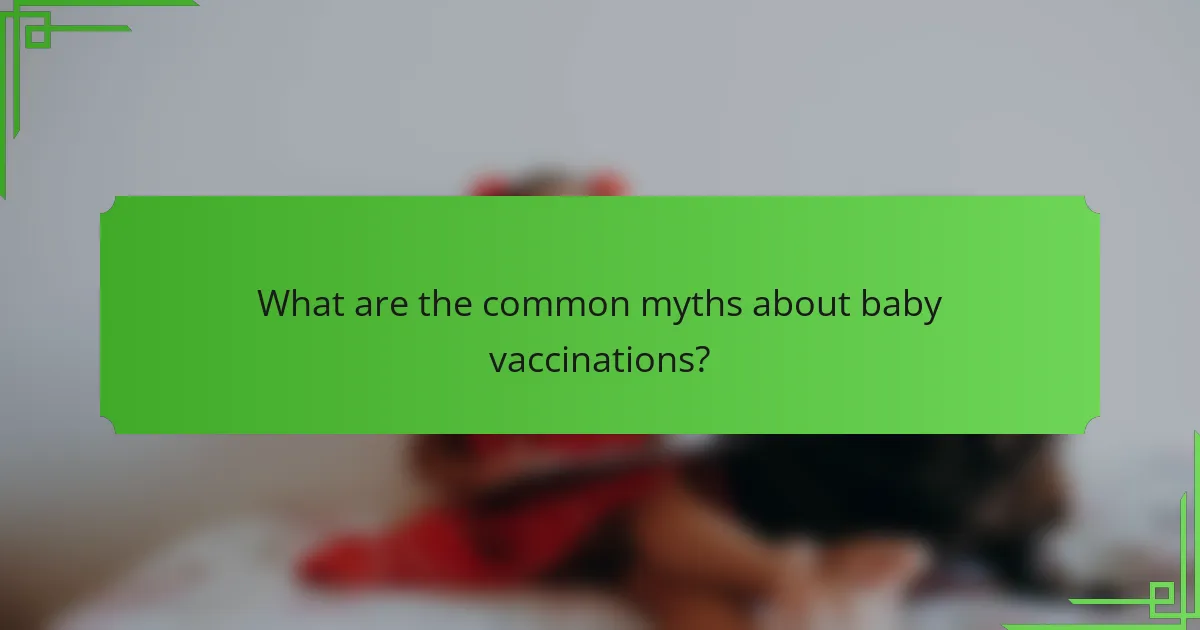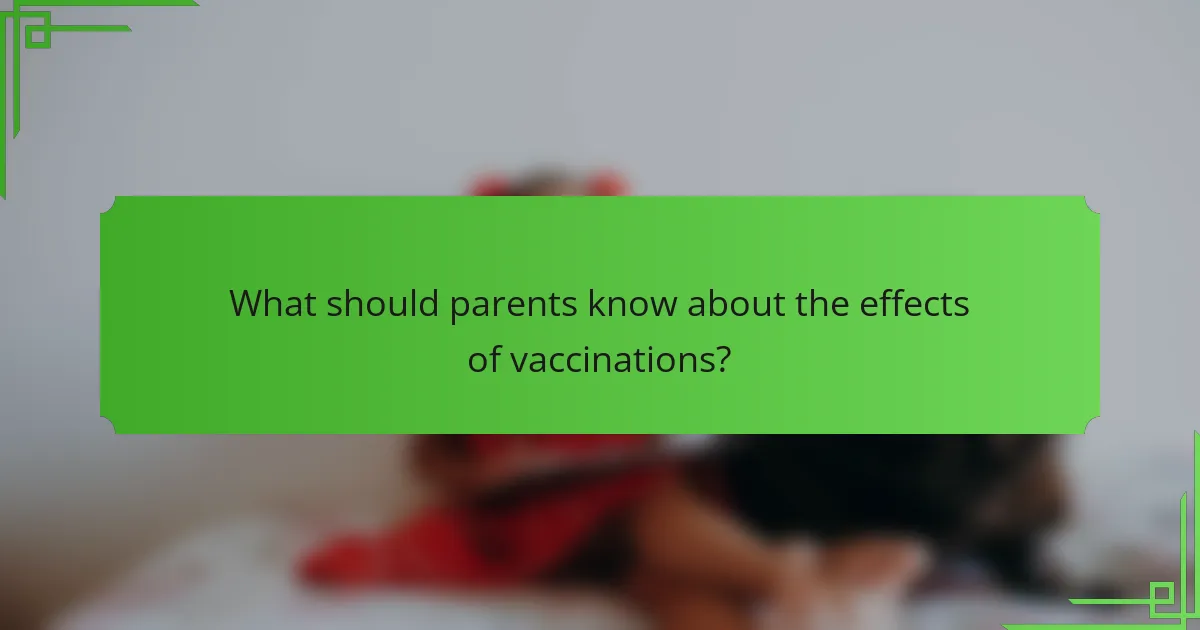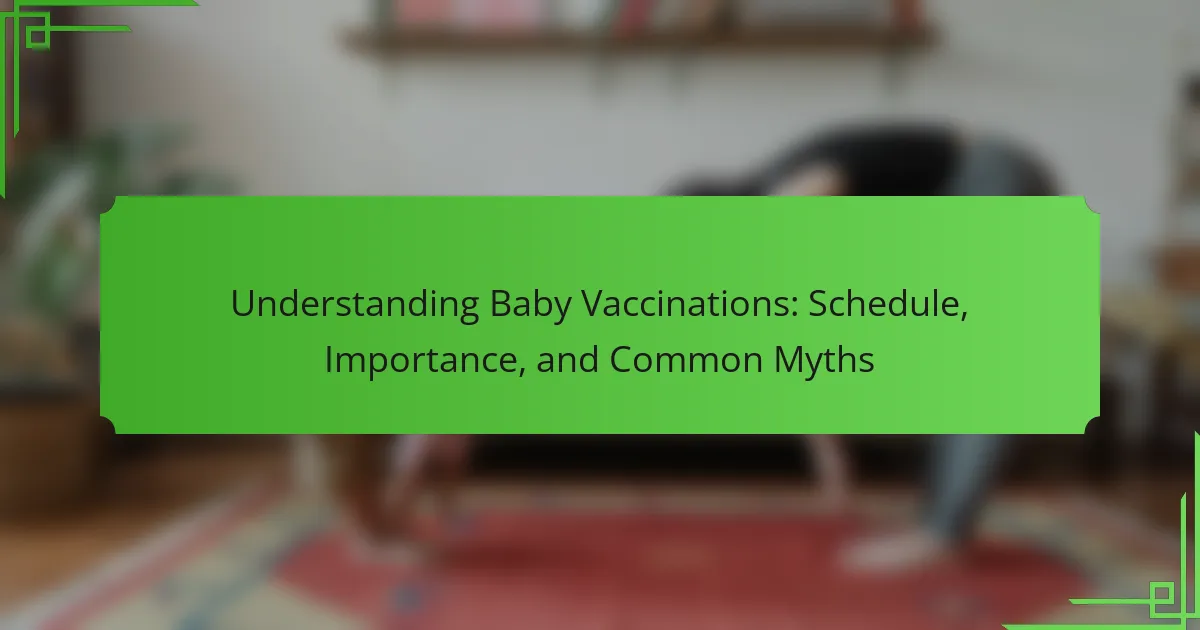Baby vaccinations are immunizations administered to infants to protect against infectious diseases such as measles, mumps, rubella, and pertussis. These vaccines are given according to a schedule recommended by health authorities and play a crucial role in stimulating the immune system to combat specific pathogens. Vaccination not only safeguards individual health but also contributes to community protection through herd immunity, preventing outbreaks. Common misconceptions about vaccinations, including false claims linking them to autism and concerns about toxins, are addressed with evidence-based information demonstrating their safety and efficacy. Overall, vaccinations are essential for maintaining public health and preventing disease incidence.

What are Baby Vaccinations?
Baby vaccinations are immunizations given to infants to protect them from various infectious diseases. These vaccinations are typically administered according to a schedule recommended by health authorities. The vaccines stimulate the immune system to recognize and fight specific pathogens. Common vaccines for babies include those for measles, mumps, rubella, and pertussis. Vaccination helps prevent outbreaks and protects not just the individual but also the community through herd immunity. According to the World Health Organization, vaccines prevent an estimated 2-3 million deaths each year.
Why are vaccinations important for babies?
Vaccinations are important for babies because they protect against serious diseases. These diseases can lead to severe health complications or even death. Vaccines help the immune system recognize and fight infections. They stimulate the production of antibodies, which are crucial for immunity. According to the World Health Organization, vaccines prevent an estimated 2 to 3 million deaths each year. Immunization also contributes to herd immunity, protecting those who cannot be vaccinated. Early vaccination is essential as infants are particularly vulnerable to infections. Overall, vaccinations are a vital part of maintaining public health and preventing outbreaks.
What diseases do baby vaccinations protect against?
Baby vaccinations protect against multiple diseases. These include measles, mumps, rubella, diphtheria, tetanus, pertussis, polio, hepatitis B, and Haemophilus influenzae type b (Hib). Vaccination schedules are designed to provide immunity at critical early stages of development. The Centers for Disease Control and Prevention (CDC) recommends specific vaccines at various ages to ensure optimal protection. For example, the MMR vaccine is given between 12 to 15 months of age. Vaccinations significantly reduce the incidence of these diseases. Historical data shows that widespread vaccination has led to a dramatic decline in cases. For instance, measles cases dropped by 99% since the introduction of the vaccine. Vaccinations not only protect individual children but also contribute to herd immunity in the community.
How do vaccinations contribute to herd immunity?
Vaccinations contribute to herd immunity by increasing the proportion of immune individuals in a population. When a significant percentage of the population is vaccinated, the spread of infectious diseases is reduced. This protects those who cannot be vaccinated, such as infants or individuals with certain medical conditions. For example, when 95% of a community is vaccinated against measles, the virus has limited opportunities to spread. Studies show that herd immunity can lead to the eradication of diseases, as seen with smallpox. Therefore, vaccinations are essential for maintaining public health and preventing outbreaks.
What is the recommended vaccination schedule for babies?
The recommended vaccination schedule for babies includes several key vaccines administered at specific ages. At birth, babies receive the hepatitis B vaccine. At 2 months, they should receive DTaP, Hib, IPV, PCV13, and RV vaccines. At 4 months, the same vaccines are typically given again. At 6 months, the hepatitis B vaccine is administered along with DTaP, Hib, IPV, PCV13, and RV vaccines. Between 12 and 15 months, babies receive the MMR, varicella, and Hib vaccines. A booster for DTaP is given between 15 and 18 months. The final doses of IPV and PCV13 are given between 4 and 6 years. This schedule is recommended by the Centers for Disease Control and Prevention (CDC) to ensure optimal protection against various diseases.
When should babies receive their first vaccinations?
Babies should receive their first vaccinations at 2 months of age. The initial vaccines typically include DTaP, IPV, Hib, PCV13, and RV. These vaccinations help protect against serious diseases. The Centers for Disease Control and Prevention (CDC) recommends this schedule. Research shows that early vaccination significantly reduces illness rates in infants. Vaccines stimulate the immune system to recognize and fight pathogens. Following the recommended vaccination schedule is crucial for public health. Delays in vaccination can lead to outbreaks of preventable diseases.
What are the key vaccines included in the schedule?
The key vaccines included in the schedule are DTaP, IPV, Hib, MMR, and Varicella. DTaP protects against diphtheria, tetanus, and pertussis. IPV immunizes against polio. Hib provides protection against Haemophilus influenzae type b. MMR is for measles, mumps, and rubella. Varicella protects against chickenpox. The CDC recommends these vaccines for infants and children to prevent serious diseases.
How can parents prepare for their baby’s vaccinations?
Parents can prepare for their baby’s vaccinations by scheduling an appointment with their pediatrician. They should review the vaccination schedule recommended by health authorities. Gathering any necessary medical records is also important. Parents can discuss any concerns or questions with the healthcare provider beforehand. Ensuring the baby is well-rested and fed can help ease the experience. Bringing a comfort item, like a favorite toy, can provide reassurance. Monitoring the baby for any side effects post-vaccination is crucial. These steps help ensure a smoother vaccination process for both the baby and the parents.
What should parents discuss with their pediatrician before vaccinations?
Parents should discuss their child’s medical history with the pediatrician before vaccinations. This includes any previous reactions to vaccines. Parents should also mention if their child has any chronic illnesses. Allergies, especially to vaccine components, must be communicated. Parents should inquire about the specific vaccines recommended. Understanding the vaccination schedule is crucial for parents. They should ask about the benefits and risks associated with each vaccine. Clarifying any misconceptions about vaccines is also important. These discussions help ensure informed decisions regarding vaccinations.
How can parents ease their baby’s discomfort during vaccinations?
Parents can ease their baby’s discomfort during vaccinations by using several effective techniques. Holding the baby during the injection can provide comfort and security. Breastfeeding or bottle-feeding during the vaccination can distract and soothe the baby. Applying a cold pack to the injection site before and after can reduce swelling and pain. Offering a pacifier can also help calm the baby. Additionally, using distraction techniques, such as toys or singing, can divert the baby’s attention. Lastly, ensuring a calm environment can help reduce anxiety for both the parent and the baby. These methods have been shown to effectively minimize discomfort during vaccinations.

What are the common myths about baby vaccinations?
Common myths about baby vaccinations include the belief that they cause autism. This myth originated from a now-discredited study published in 1998. Extensive research has since shown no link between vaccines and autism. Another myth is that vaccines contain harmful levels of toxins. Vaccines are rigorously tested for safety and contain only trace amounts of these substances. Some people believe that natural immunity is better than vaccine-acquired immunity. However, vaccines provide safe and effective protection without the risks of natural infections. Additionally, some think that too many vaccines can overwhelm a baby’s immune system. The immune system can handle multiple vaccines simultaneously. Lastly, there is a myth that vaccines are unnecessary if disease rates are low. Vaccination is crucial for maintaining herd immunity and preventing outbreaks.
What misconceptions do parents have about vaccine safety?
Parents often believe that vaccines cause autism. This misconception originated from a discredited study published in 1998 by Andrew Wakefield. Numerous large-scale studies have since shown no link between vaccines and autism, including a 2014 study in “Annals of Internal Medicine” involving over 95,000 children.
Another common belief is that vaccines contain harmful levels of toxins. In reality, vaccine ingredients are present in extremely low doses, well below harmful levels. The Centers for Disease Control and Prevention (CDC) states that the benefits of vaccines far outweigh any potential risks.
Some parents think that natural immunity is better than vaccine-acquired immunity. However, natural infections can lead to severe complications, while vaccines provide safe immunity without the associated risks.
Additionally, many parents fear that vaccines overload the immune system. The immune system can handle thousands of antigens at once. Vaccines only introduce a tiny fraction of what the immune system can manage.
Lastly, some believe that vaccines are unnecessary if the disease is rare. Vaccination helps maintain herd immunity, protecting those who cannot be vaccinated. The World Health Organization emphasizes that the resurgence of diseases can occur if vaccination rates drop.
How do vaccines affect a baby’s immune system?
Vaccines stimulate a baby’s immune system to recognize and fight specific pathogens. They introduce harmless components of viruses or bacteria, known as antigens. This exposure trains the immune system to respond effectively to future infections. Vaccines help develop immunity without causing the disease. For example, the measles vaccine reduces the risk of severe illness by 99%. Research shows vaccinated children have lower hospitalization rates for vaccine-preventable diseases. Overall, vaccines enhance a baby’s immune response and protect against serious health threats.
Are there risks associated with delaying vaccinations?
Delaying vaccinations can pose significant health risks. Children who are not vaccinated on schedule are more susceptible to preventable diseases. For example, measles outbreaks have been linked to lower vaccination rates. According to the CDC, unvaccinated individuals can contribute to the spread of infections. Delayed vaccinations can also lead to more severe health complications if diseases occur. The World Health Organization notes that timely vaccination is crucial for community immunity. Delaying vaccines may result in longer recovery times and increased healthcare costs. Overall, the risks associated with delaying vaccinations highlight the importance of adhering to recommended schedules.
Why do some parents choose not to vaccinate their babies?
Some parents choose not to vaccinate their babies due to concerns about vaccine safety and potential side effects. They may believe that vaccines can cause harm or lead to health issues. Misinformation about vaccines can spread easily, influencing parental decisions. Some parents may prioritize natural immunity over vaccination. Personal beliefs or religious convictions can also play a role in this choice. Additionally, a lack of access to healthcare resources can impact vaccination rates. Studies indicate that vaccine hesitancy is a growing public health concern. According to the World Health Organization, misinformation and distrust are significant barriers to vaccination.
What are the arguments against vaccinations?
Arguments against vaccinations include concerns about safety, effectiveness, and personal freedom. Some individuals believe vaccines can cause adverse reactions, such as allergies or autoimmune diseases. Others argue that the effectiveness of vaccines is overstated, citing breakthrough infections. There are also beliefs that natural immunity is superior to vaccine-induced immunity. Some people oppose mandatory vaccinations, viewing them as an infringement on personal rights. Misinformation and anecdotal evidence often fuel these arguments. Studies show that vaccine hesitancy is linked to distrust in pharmaceutical companies and healthcare systems.
How do these decisions impact public health?
Decisions regarding baby vaccinations significantly impact public health by influencing herd immunity. High vaccination rates protect vulnerable populations, including infants and those with compromised immune systems. According to the CDC, vaccines prevent approximately 4-5 million deaths annually worldwide. When vaccination rates decline, outbreaks of preventable diseases can occur, as seen with measles in communities with lower immunization coverage. Additionally, decisions about vaccination schedules can affect the timing of immunity development in infants. Timely vaccinations lead to a quicker establishment of community immunity, reducing the spread of diseases. Overall, informed vaccination decisions are crucial for maintaining public health and preventing disease outbreaks.

What should parents know about the effects of vaccinations?
Vaccinations protect children from various infectious diseases. They stimulate the immune system to recognize and fight pathogens. Common side effects include mild fever, soreness at the injection site, and fatigue. Serious side effects are rare but can occur. Vaccinations contribute to herd immunity, protecting those unable to be vaccinated. Studies show that vaccines have significantly reduced disease incidence. For example, the measles vaccine decreased cases by over 99% in the U.S. Vaccination schedules are designed to maximize effectiveness and safety. Parents should consult healthcare providers for personalized vaccination advice.
What are the common side effects of baby vaccinations?
Common side effects of baby vaccinations include mild fever, irritability, and soreness at the injection site. These reactions are typically short-lived and resolve within a few days. Other side effects can include loss of appetite and mild rash. Serious side effects are rare. According to the Centers for Disease Control and Prevention (CDC), most babies experience only minor reactions. Vaccinations are crucial for preventing serious diseases. The benefits of vaccination far outweigh the risks of side effects.
How can parents differentiate between normal and concerning reactions?
Parents can differentiate between normal and concerning reactions to vaccinations by observing specific symptoms. Normal reactions often include mild fever, slight swelling at the injection site, or fussiness. These symptoms typically resolve within a few days. In contrast, concerning reactions may involve high fever, persistent crying, or unusual behavior. Parents should also be alert for severe allergic reactions, such as difficulty breathing or hives. According to the Centers for Disease Control and Prevention (CDC), these severe reactions are rare but require immediate medical attention. Monitoring the duration and severity of symptoms helps parents determine the need for professional evaluation.
What resources are available for parents regarding vaccinations?
Parents can access various resources regarding vaccinations. The Centers for Disease Control and Prevention (CDC) provides comprehensive information on vaccination schedules and recommendations. The American Academy of Pediatrics (AAP) offers guidance tailored for parents, including FAQs and vaccine safety information. Local health departments also provide vaccination clinics and educational materials. Websites like Vaccines.gov help locate vaccination services. Additionally, healthcare providers can answer specific questions and concerns about vaccines. These resources ensure parents have accurate information to make informed decisions about their children’s vaccinations.
Where can parents find reliable information about vaccines?
Parents can find reliable information about vaccines from reputable health organizations. The Centers for Disease Control and Prevention (CDC) provides comprehensive vaccine information. The World Health Organization (WHO) also offers trusted guidance on vaccines. Additionally, the American Academy of Pediatrics (AAP) has resources specifically for parents. These organizations base their information on scientific research and expert consensus. Parents can also consult their child’s healthcare provider for personalized advice. Using these sources ensures access to accurate and up-to-date vaccine information.
What support groups exist for parents with vaccination concerns?
Support groups for parents with vaccination concerns include the Vaccine Information Network and Parents of Vaccine-Injured Children. The Vaccine Information Network provides resources and community support for parents seeking information. Parents of Vaccine-Injured Children offers a platform for sharing experiences and support. These groups focus on education and advocacy related to vaccination issues. Research shows that peer support can alleviate anxiety in parents regarding vaccinations.
What are best practices for ensuring a positive vaccination experience?
To ensure a positive vaccination experience, providers should create a welcoming environment. This includes having trained staff who can address concerns calmly. Clear communication about the vaccination process is essential. Parents should receive information on what to expect before, during, and after vaccination. Comfort measures, such as distraction techniques, can help ease anxiety. Providing a comfortable waiting area can also enhance the experience. Studies show that positive environments reduce stress for both children and parents. According to the CDC, a supportive atmosphere encourages vaccination adherence.
Baby vaccinations are immunizations administered to infants to protect against various infectious diseases, following a schedule recommended by health authorities. This article covers the importance of vaccinations for babies, the diseases they prevent, and the recommended vaccination schedule. It also addresses common myths and misconceptions surrounding vaccines, the significance of herd immunity, and how parents can prepare for their child’s vaccinations. Additionally, the article highlights the potential risks of delaying vaccinations and provides resources for parents seeking reliable information on vaccine safety and efficacy.
